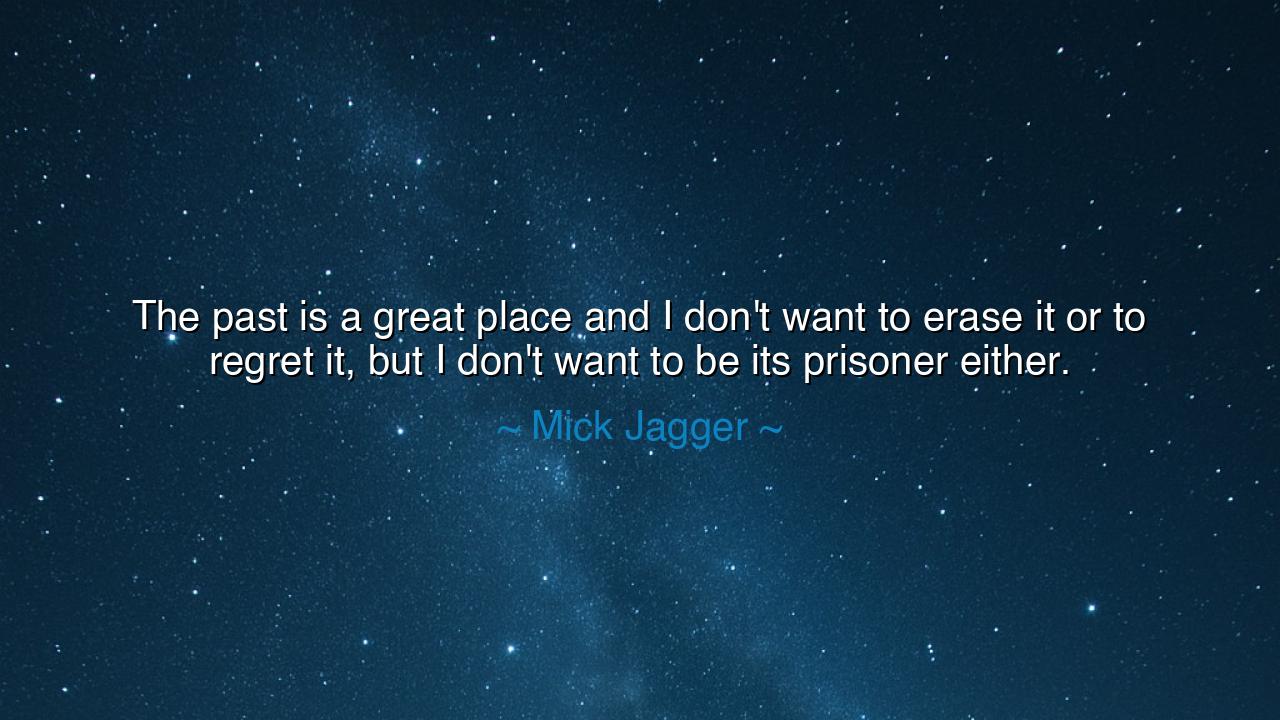
The past is a great place and I don't want to erase it or to
The past is a great place and I don't want to erase it or to regret it, but I don't want to be its prisoner either.






Hearken, children of the future, and attend to the words of Mick Jagger, a voice that has traversed decades and stages, declaring: “The past is a great place and I don't want to erase it or to regret it, but I don't want to be its prisoner either.” At first, these words may seem a reflection on memory and fame, yet beneath them lies a profound meditation on time, freedom, and the delicate balance between reverence and release. The ancients understood well that the past is a vast river, carrying both treasures and debris, and that wisdom lies in learning to navigate its waters without being swept away.
Jagger’s reflection begins with an acknowledgment of the greatness of the past. Every triumph, every folly, every melody sung or battle fought, is a thread in the tapestry of our being. To deny it, to erase it, is to deny the very foundation upon which the present is built. Consider the philosophers of Athens, who studied the works of their predecessors not to mimic them blindly but to understand the currents of thought that had shaped the world. In revering the past, one honors the lessons, the beauty, and the courage that echo through time, recognizing that memory is a guide and a gift.
Yet, Jagger warns against the chains of nostalgia, the danger of being a prisoner of what has already passed. To live solely in memory is to forfeit the vitality of the present. History, when clutched too tightly, can imprison the spirit, making one a spectator of one’s own life rather than an architect of what is yet to come. The Roman Stoics, like Seneca and Marcus Aurelius, counseled that while one must learn from experience, one must not be bound by it; the soul must remain free to act and create anew.
The wisdom in Jagger’s words is mirrored in the lives of many who have danced between reverence and liberation. Consider Leonardo da Vinci, who absorbed the accumulated knowledge of his age yet refused to be constrained by convention. He studied nature, the works of past masters, and the mysteries of anatomy, yet his mind remained untethered, crafting inventions and art that transcended the limitations of his time. In this, we see the delicate balance Jagger describes: to honor the past without being confined by it.
There is also a lesson in self-forgiveness and acceptance. To look upon the past without regret is to recognize the imperfection of life and the inevitability of human error. Even the great Julius Caesar, whose campaigns reshaped the known world, faced failures and betrayals. Yet he did not dwell eternally upon them; he absorbed their lessons and pressed forward. Jagger’s insight calls us to do the same: cherish the experiences that formed us, learn from missteps, but do not allow them to dictate the cadence of our present or the promise of our future.
This wisdom also underscores the dynamic interplay between memory and action. The past is a teacher, not a jailer. It informs our decisions, enriches our creativity, and shapes our understanding, yet it must not dictate our movement through life. One sees this in the story of Nelson Mandela, who endured decades of imprisonment yet emerged not as a prisoner of resentment but as a liberator, using his past as a foundation for justice and reconciliation. Like Jagger, Mandela illustrates that the past can be treasured without becoming a chain.
From these reflections emerges a practical teaching: cultivate respect for your history, embrace its lessons, and forgive its mistakes, yet maintain vigilance over the freedom of your spirit. Engage with your memories as a gardener tends a fertile soil: draw nourishment from them, yet allow the present to bloom unshackled. In action, in creation, in love and work, do not allow the past to dictate your steps; let it inform, not imprison.
Thus, let it be known: life is a river flowing ever forward, and while its waters carry the echoes of yesterday, they also carve new paths into tomorrow. Honor the past, forgive its wounds, treasure its joys, and step boldly into the present, for it is here, in the living moment, that true freedom and greatness reside. To cling too tightly is to drown; to abandon it entirely is to wander blind. Walk the path with wisdom, balance, and courage, and you will navigate the currents of time as a master of your own fate.






AAdministratorAdministrator
Welcome, honored guests. Please leave a comment, we will respond soon